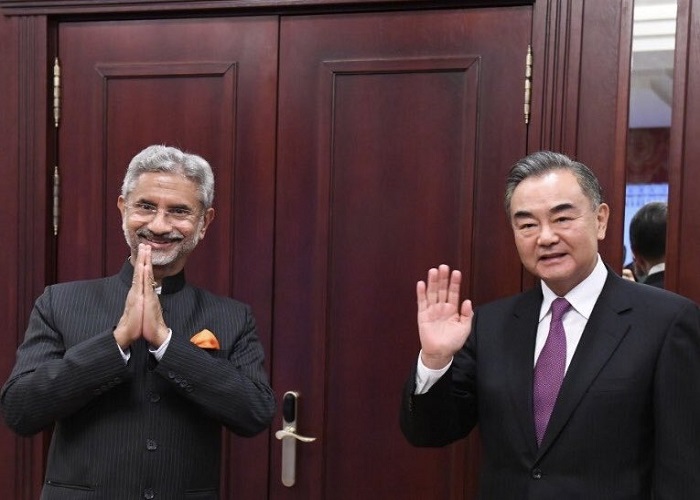Vientiane (Laos): External Affairs Minister S Jaishankar on Thursday emphasised the need to ensure “full respect” for the Line of Actual Control (LAC) and past agreements to “stabilise” and “rebuild” bilateral ties with Beijing as he met his Chinese counterpart Wang Yi for the second time within a month.
The two leaders, who are in the Laotian capital to participate in the meetings of the Association of Southeast Asian Nations (ASEAN), also agreed on the need to give strong guidance to complete the disengagement process following the military standoff in eastern Ladakh in May 2020.
“Met with Communist Party of China Politburo member and Foreign Minister Wang Yi in Vientiane today. Continued our ongoing discussions about our bilateral relationship. The state of the border will necessarily be reflected on the state of our ties,” Jaishankar said in a post on X after meeting with Wang on the sidelines of the ASEAN Foreign Ministers’ Meetings here.
India has been maintaining that its ties with China cannot be normal unless there is peace in the border areas.
The Jaishankar-Wang talks came amid the dragging border row in eastern Ladakh that entered its fifth year in May.
“Agreed on the need to give strong guidance to complete the disengagement process. Must ensure full respect for the LAC and past agreements. It is in our mutual interest to stabilise our ties. We should approach the immediate issues with a sense of purpose and urgency,” Jaishankar added.
In a statement, the Ministry of External Affairs (MEA) said the meeting gave the two ministers an opportunity to review the situation since their last meeting at Astana on July 4.
“Their talks focussed on finding an early resolution of the remaining issues along the Line of Actual Control (LAC) to stabilise and rebuild bilateral relations,” it said.
“Both Ministers agreed on the need to work with purpose and urgency to achieve complete disengagement at the earliest. Peace and tranquillity on the borders and respect for LAC are essential for normalcy in bilateral relations,” the MEA said.
“Both sides must fully abide by relevant bilateral agreements, protocols, and understandings reached between the two Governments in the past. EAM stressed the importance of the three mutuals — mutual respect, mutual interest and mutual sensitivity — to our ties,” it said.
Both sides will hold an early meeting of the Working Mechanism on Consultation and Coordination on India-China Border Affairs (WMCC) to take the discussions forward, the statement said.
The two ministers also exchanged views on the global and regional situation, the MEA added.
Meanwhile, the Chinese foreign ministry, in a statement, said that Wang emphasised that in the face of the current complex international situation and severe global challenges, China and India, as two major developing countries and two emerging economies living next to each other, should strengthen dialogue and communication.
The two countries should also enhance understanding and mutual trust, properly handle contradictions and differences, and develop mutually beneficial cooperation.
Both sides should take responsibility for history, the people and the world, and rationally transcend contradictions, differences and frictions to promote the improvement and stable and sustainable development of China-India relations, the statement quoted the Chinese foreign minister as saying.
Wang said that China-India relations have an important impact beyond the bilateral scope.
He expressed the hope that the two sides will meet each other halfway, actively explore the correct way for the two neighbouring major countries to get along, and guide all sectors to establish a positive understanding of each other.
Wang also stressed that it is in the interests of both sides for China-India relations to return to the right track, and it is also the common expectation of the “Global South” countries.
The two sides agreed to work together to maintain peace and tranquillity in the border areas and promote new progress in border affairs consultations, the Chinese statement added.
On July 4, Jaishankar and Wang in the Kazakh capital city of Astana on the sidelines of the summit of the Shanghai Cooperation Organisation (SCO).
During the meeting in Astana, Jaishankar reaffirmed India’s persistent view that the relations between the two sides must be based on mutual respect, mutual interest and mutual sensitivity.
The Indian and Chinese militaries have been locked in a standoff since May 2020 and a full resolution of the border row has not yet been achieved though the two sides have disengaged from a number of friction points.
The ties between the two countries nosedived significantly following the fierce clash in the Galwan Valley in June 2020 that marked the most serious military conflict between the two sides in decades.
The two sides have so far held 21 rounds of Corps Commander-level talks to resolve the standoff.
India has been pressing the People’s Liberation Army (PLA) to disengage from the Depsang and Demchok areas.
The two sides held the last round of high-level military talks in February.
Though there was no indication of a breakthrough at the 21st round of talks, both sides agreed to maintain “peace and tranquillity” on the ground and continue the communication on the way ahead.






